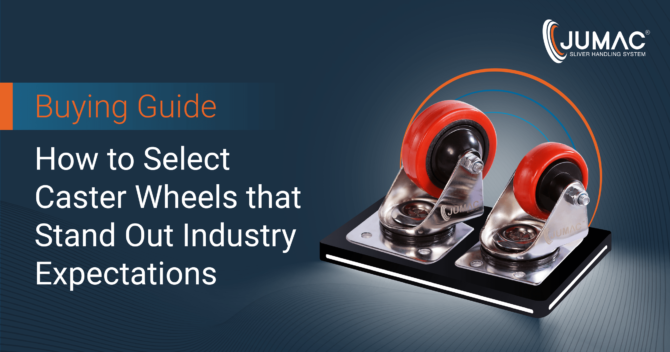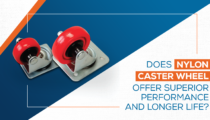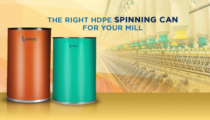The sliver cans manufactured for the spinning industry are used…

Buying Guide – How To Select Caster Wheels That Meet Industry Expectations
Across the world, the surging demand for high-quality yarns is pulling up the need for durable and efficient HDPE spinning can products. That, in turn, is boosting the demand for caster wheels – one of the most important components of sliver cans – as well. For glitch-free sliver handling in particular, and smooth spinning mill machinery operations in general, the importance of selecting the ‘right’ caster wheels (that would indeed enhance the usability and performance of the spinning cans) is immense. Here’s a comprehensive buying guide that will help you choose the best caster wheels for spinning cans:
Be Familiar With The Different Types Of Caster Wheels
Broadly speaking, a ‘caster’ (which comprises the wheel and the mount) can be of two varieties. The first is the ‘fixed caster’ or the ‘rigid caster’. The maneuverability of these casters is relatively limited – since they can only be moved/rolled backward and forward. On the other hand, there are ‘swivel casters’ with cylindrical raceways, which enable the wheels to turn (and hence, have higher mobility). Swivel casters can either be with ‘kingpin’ (which is, in essence, a bolt for holding the raceway) or ‘kingpinless’. Based on the type and degree of maneuverability you need for efficient sliver handling, you need to choose rigid or swivel casters.
Must Read : Complete Guide on Types of Caster Wheels for Spinning Cans
Consider The Load-Bearing Capacity Of The Caster Wheels
Excessive pressure on spinning can accessories in general, and caster wheels in particular, can cause problems in material handling – and may even lead to the sliver cans getting damaged. In order to do away with such risks, you need to check the weight/load ratings of the caster wheels you are planning to buy. Select such caster(s) that would be able to support the required amount of sliver weight. As a rule of thumb, go for caster wheels that have the capability to support ~25%-30% more weight than what is required. That would ensure a proper safety buffer.
Note: You can take your pick from light-duty, medium-duty and heavy-duty casters, as per your requirements.
Check The Diameter Of The Caster Wheel & The Fixing Module
To ensure that each spinning can at your mill can be moved seamlessly, the caster wheels fitted to them need to be of the right diameter. Given that sliver cans of different sizes are used at the various stages of the spinning process – it is only natural that they would require caster wheels of varying diameters (generally, the bigger wheels can be moved more easily). In addition, the setup used to fix caster wheels to the spinning unit needs to be checked as well. Apart from top-plate fixing, threaded stem and bolt hole methods are also used. Check the fixing dimensions too.
Pay Attention To The Maintenance Requirements
In order to ensure that the sliver cans maintain their functionality (of seamlessly moving the generally heavy sliver pallets) for a long time, enquire the spinning can manufacturer about the maintenance requirements of the caster wheels. Apart from day-to-day maintenance requirements, find out how the wheels and mounts have to be cleaned – to keep them free from fluff and dust. You also need to find out how damaged/worn out wheels (e.g., screw looseness or flat tires) should be repaired or replaced. The top spinning can manufacturers, like Jumac Cans, generally have different types of caster wheels and other accessories in their portfolio.
Recommended Reading – Why are Caster Wheels important?
Superior Floor Compatibility Ensures Better Spinning Can Performance
The wheel material used in casters can be made of different materials – each offering a certain degree of ‘wheel hardness’. While those made of relatively soft material generate very little vibration and are fairly easy to move around, wheels designed from harder materials have comparatively lower ‘rolling resistance’ as well as ‘starting resistance’ (wheel hardness is measured in scales like Brinell, Shore A, Shore D, etc.). In case your spinning mill floor has a rough/uneven surface, opt for caster wheels with large diameters. You should also need to consider the impact of the wheel and spinning can movement on the floor surface.
Ask About The Material Of The Caster Wheels
When you purchase HDPE sliver cans or spinning can accessories, you need to be aware of the raw material used in their manufacturing process. Prior to purchasing caster wheels, get all the details of their material. Polypropylene and Nylon 6 caster wheels are often used for fitting in sliver cans, ensuring smooth mobility. Rubber, polyurethane, stainless steel and neoprene wheels are also available.
Consider The Caster Configuration & Wheel Bearings
For smooth spinning can operations on the mill floor, you need to select high-performance caster wheels that offer an ideal combination of easy maneuverability and superior load support capacity. For this, the configuration of the casters has to be paid due attention to. In many cases, two fixed and two swivel caster wheels are used – since this configuration gives excellent handling control and mobility. As an alternative, a configuration with four swivel casters can also be opted for (however, this is not suitable for high sliver loads). Do your research about possible caster configurations, and find out which one would be the most efficient for your system.
The caster wheel bearings are instrumental in minimising the level of friction between the wheels and the axle. Due to the way in which they operate, high-quality roller-bearing caster wheels are more effective in bringing down the friction – than the regular bore-bearing caster wheels. Of course, wheel bearings may not be required at all, when extended rolls are not needed.
Indoor Usage Vs Outdoor Usage Of Caster Wheels
The choice of caster wheels also depends in a big way on the conditions in which the spinning can will be used. If you are looking for casters for external usage, select products with robust shock resistance properties. On the other hand, smooth maneuverability should be the most important feature in wheels that are used indoors. Make sure that the caster wheels you purchase are heat-resistant and are not adversely affected by chemicals/reagents either.
Procure Caster Wheels From A Reputed Supplier
In order to get the best value out of caster wheels (and in general, textile spinning cans), make it a point to source them from a reliable manufacturer. Check out the portfolios of the top suppliers, do an in-depth comparison, and select the company that seems to be the most suitable. Ideally, the supplier you choose should have a proper track record of delivering a complete range of sliver cans, caster wheels and other accessories.
Caster wheels are among the most essential spinning can accessories – and they determine the overall ease of mobility/maneuverability of the sliver on the spinning mill floor. They offer the requisite support to sliver cans, and help in maintaining proper balance during can movements. Different varieties of caster wheels are available, and the onus is on spinning mill owners & operators to understand their precise material handling requirements, and select caster wheels from a reputed, reliable manufacturer accordingly. Given that sub-standard caster wheels can pose serious sliver movement problems (and cause resultant imperfections), there is simply no room for error in this regard.

Passionate about transforming the industrial sector of textile and spinning industry with innovative solutions. Director at Jumac Manufacturing, leading spinning cans and accessories manufacturer and exporter from Kolkata, India.









